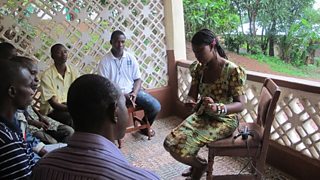Help where it is needed most
Kirsty Cockburn
Director of Communications and Fundraising, Βι¶ΉΤΌΕΔ Media Action
Tagged with:

Mariama Khai Fornah training radio producers in Kenema, Eastern Sierra Leone
Our work to tackle the Ebola crisis reminds us that we all have a part to play
I played the public service announcement (PSA) to a room full of Βι¶ΉΤΌΕΔ colleagues in Bristol. It was the voice of my colleague Mariama Sesay, based in Freetown. She was speaking in Krio, a language based on English that we could partly understand. But one thing was instantly recognisable – and that was her tone.
“She sounds cross doesn’t she?” I asked. A few smiled, there was general agreement. “But it’s actually urgency and concern. Mariama needs people to listen and to understand. It’s not mildly useful information she is broadcasting: this is as urgent and real to Mariama and her family as it is to the rest of the country.”
Our team of 43 in Sierra Leone has been working hard to ensure radio broadcasts are providing people with information they need to help tackle stigma and to provide timely and reliable advice about transmission and treatment. Their aim is to keep people informed.
In late September, people across the country were asked to stay at home for three days while the authorities tried to take stock and assess new cases. In challenging times this was a potentially frightening new development – people wanted to know what was happening, why couldn’t they go out, what should they do? So we increased the number and length of our broadcasts, encouraging people to take part in our programmes, share concerns and information, and to seek expert advice. Across the three days our partner stations received more than 3,500 texts.
A looming crisis
I visited Sierra Leone two years ago with a film-maker. I met two colleagues called Mariama, both journalists. Mariama Sesay, the fierce, passionate journalist who featured in the Ebola PSA, was then working on Fo Rod, a governance themed radio show. I heard her questioning studio guests about healthcare provision, back then unaware of the crisis looming that would bring a fragile infrastructure to its knees.
I also met Mariama Khai Fornah based in Kenema, in the north east of the country, where she was producing a radio programme aimed at supporting more than 140,000 cocoa farmers. The long civil war had pushed a generation off the land, and production of cocoa, a precious commodity, needed a boost. Mariama and colleagues broadcast a radio drama, similar to The Archers, to take farmers through a fictional year of cocoa cultivation. The drama sat alongside a phone in with experts. Her commitment shone through, as you can see in this .
Team effort
Today Mariama is still in Kenema, which is one of the areas hardest hit by Ebola, though recent rates of infection have slowed. The cocoa programme is on hold as Mariama turns her expertise – like the rest of our team in Sierra Leone – towards the Ebola response, conducting interviews and making packages for .
My lunchtime talk in Bristol was part of a tour of Βι¶ΉΤΌΕΔ offices to share insights about the work. As Ebola has climbed up the international news agenda so too has it become an area of our work of particular interest to Βι¶ΉΤΌΕΔ colleagues. And in turn they have offered us a helping hand. In times of crisis we don’t just ask what can we do, we have to ask “what can we afford to do?” Our Βι¶ΉΤΌΕΔ colleagues have – in significant numbers and in a personal capacity – volunteered to donate to our work. As the Βι¶ΉΤΌΕΔ’s international development charity we rely on support like this. On behalf of the Mariamas and their fellow Sierra Leoneans – we are deeply grateful.
Follow Βι¶ΉΤΌΕΔ Media Action on and
